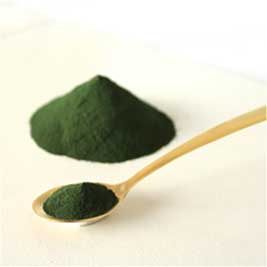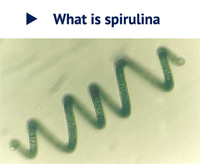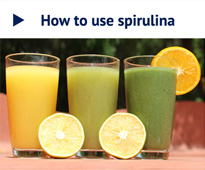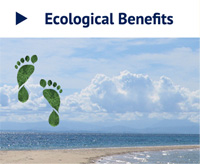
NUTRITIONAL VALUE
Spirulina is called a superfood because it is a highly potent, concentrated food source, containing most essential micronutrients which our body needs in small quantities. Due to its high nutritional value, it is an exceptional health and energy booster.
Spirulina is a low-fat, low-calorie and cholesterol-free nutrient comprised of an unusual high level of protein, essential vitamins and phytonutrients such as the rare essential fatty acid GLA, sulfplipids, glycolipids and polysaccharides.
Spirulina has no cellulose in its cell walls and is therefore easily digested and assimilated.
Spirulina has properties that are favourable for a wide range of health conditions. Only a few are mentioned below.
Spirulina is the richest source of natural Beta Carotene, ten times more concentrated than in carrots. Natural Beta Carotene is superior to the synthetic variety because the human body converts Beta Carotene to Vitamin A only as needed: Vitamin A will therefore NOT build up in the body and become toxic.
Beta Carotene is a very important antioxidant. Several studies indicated that foods rich in Beta Carotene and Vitamin A reduce the risk of cancer.
Spirulina is the richest source of natural Beta Carotene, ten times more concentrated than in carrots. Natural Beta Carotene is superior to the synthetic variety because the human body converts Beta Carotene to Vitamin A only as needed: Vitamin A will therefore NOT build up in the body and become toxic.
Beta Carotene is a very important antioxidant. Several studies indicated that foods rich in Beta Carotene and Vitamin A reduce the risk of cancer.
Spirulina is the richest source of natural Beta Carotene, ten times more concentrated than in carrots. Natural Beta Carotene is superior to the synthetic variety because the human body converts Beta Carotene to Vitamin A only as needed: Vitamin A will therefore NOT build up in the body and become toxic.
Beta Carotene is a very important antioxidant. Several studies indicated that foods rich in Beta Carotene and Vitamin A reduce the risk of cancer.
Spirulina is the richest source of natural Beta Carotene, ten times more concentrated than in carrots. Natural Beta Carotene is superior to the synthetic variety because the human body converts Beta Carotene to Vitamin A only as needed: Vitamin A will therefore NOT build up in the body and become toxic.
Beta Carotene is a very important antioxidant. Several studies indicated that foods rich in Beta Carotene and Vitamin A reduce the risk of cancer.
Spirulina is the richest source of natural Beta Carotene, ten times more concentrated than in carrots. Natural Beta Carotene is superior to the synthetic variety because the human body converts Beta Carotene to Vitamin A only as needed: Vitamin A will therefore NOT build up in the body and become toxic.
Beta Carotene is a very important antioxidant. Several studies indicated that foods rich in Beta Carotene and Vitamin A reduce the risk of cancer.
Spirulina is the richest source of natural Beta Carotene, ten times more concentrated than in carrots. Natural Beta Carotene is superior to the synthetic variety because the human body converts Beta Carotene to Vitamin A only as needed: Vitamin A will therefore NOT build up in the body and become toxic.
Beta Carotene is a very important antioxidant. Several studies indicated that foods rich in Beta Carotene and Vitamin A reduce the risk of cancer.
Spirulina is the richest source of natural Beta Carotene, ten times more concentrated than in carrots. Natural Beta Carotene is superior to the synthetic variety because the human body converts Beta Carotene to Vitamin A only as needed: Vitamin A will therefore NOT build up in the body and become toxic.
Beta Carotene is a very important antioxidant. Several studies indicated that foods rich in Beta Carotene and Vitamin A reduce the risk of cancer.
Spirulina is the richest source of natural Beta Carotene, ten times more concentrated than in carrots. Natural Beta Carotene is superior to the synthetic variety because the human body converts Beta Carotene to Vitamin A only as needed: Vitamin A will therefore NOT build up in the body and become toxic.
Beta Carotene is a very important antioxidant. Several studies indicated that foods rich in Beta Carotene and Vitamin A reduce the risk of cancer.
Spirulina is the richest source of natural Beta Carotene, ten times more concentrated than in carrots. Natural Beta Carotene is superior to the synthetic variety because the human body converts Beta Carotene to Vitamin A only as needed: Vitamin A will therefore NOT build up in the body and become toxic.
Beta Carotene is a very important antioxidant. Several studies indicated that foods rich in Beta Carotene and Vitamin A reduce the risk of cancer.
Spirulina is the richest source of natural Beta Carotene, ten times more concentrated than in carrots. Natural Beta Carotene is superior to the synthetic variety because the human body converts Beta Carotene to Vitamin A only as needed: Vitamin A will therefore NOT build up in the body and become toxic.
Beta Carotene is a very important antioxidant. Several studies indicated that foods rich in Beta Carotene and Vitamin A reduce the risk of cancer.
Information is provided for information purposes only and is not meant to substitute for the advice provided by your own physician or other medical professional.
'Let food be your medicine
and medicine your food.' Hippocrates (460-370 BC)
Tests done by NASA found spirulina to be an excellent, compact space food for astronauts. One kilo of spirulina is equivalent to 1000 kgs. of assorted vegetables.

| General Analysis | |
|---|---|
| Protein | 57% |
| Lipids | 6% |
| Carbohydrates | 20% |
| Minerals (ash) | 12% |
| Moisture | 5% |
| Values (per 100g dried spirulina) |
|
|---|---|
| Energy | 360Kcal |
| Phycocyanin | 1.37mg |
| Total carotenoids | 0.2g |
| Chlorophylls | 1.01g |
| Vitamin B12 | 16.4µg |
| Gamma Linolic Acid | 0.02g |
| Iron | 13.04mg |
| Note: This profile may vary slightly, depending on production factors | |


